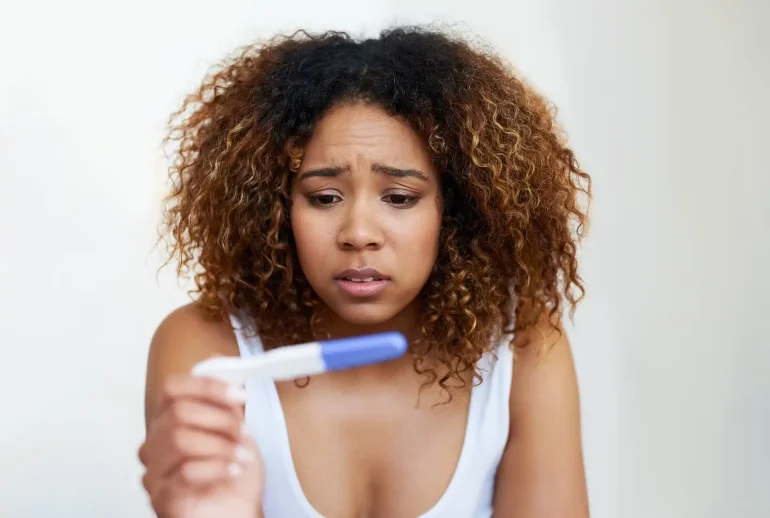Can I Be Pregnant With a Negative Test? Here’s What You Need to Know
If you’ve taken a pregnancy test, seen a negative result, and still feel pregnant — you’re not alone. Thousands of people every month search online for answers to this exact situation. The short answer? Yes, it’s possible to be pregnant even if your test comes back negative. But it depends on several key factors — and understanding them is the first step to clarity.
Let’s break it down.
1. How Pregnancy Tests Work — And Why They Can Show Negative Even If You’re Pregnant
Pregnancy tests work by detecting the hormone hCG (human chorionic gonadotropin) in your urine or blood. This hormone is produced shortly after a fertilized egg attaches to your uterine lining — typically 6 to 12 days after ovulation.
But here’s the catch: hCG levels vary wildly, especially in early pregnancy. If you test too early, there might not be enough hCG in your system for a test to detect — even if you are pregnant.
For more on how pregnancy tests detect hCG, see the Mayo Clinic’s pregnancy test overview.
2. 5 Reasons You Can Be Pregnant With a Negative Test
a. Testing Too Early Can Lead to a False Negative
Most tests are marketed as being able to detect pregnancy before your missed period. But this is often only true for a small percentage of people. Testing before your period can easily lead to a false negative. It’s best to wait at least a week after a missed period for the most accurate result.
b. Diluted Urine Might Hide Pregnancy Hormones
If you’ve had a lot to drink before taking your test, your urine may be too diluted. This reduces hCG concentration, which can cause a false negative.
Pro tip: Always take the test with your first morning urine — it’s the most concentrated.
c. Can a Faulty Pregnancy Test Give a Negative Result?
Not all tests are created equal. A test past its expiration date, stored improperly, or with a manufacturing defect may not detect hCG even when present.
d. Ectopic Pregnancy: A Hidden Cause of Negative Tests
In rare cases, a pregnancy that implants outside the uterus (often in the fallopian tube) can result in lower-than-expected hCG levels, causing a negative test — even though you’re technically pregnant.
If you suspect an ectopic pregnancy, read this medical advisory from ACOG.
e. Hormones or Health Issues That Mimic Pregnancy
Conditions like PCOS (Polycystic Ovary Syndrome) or perimenopause can mimic pregnancy symptoms and mess with your cycle, leading you to test — even when pregnancy isn’t the cause.
Still not sure when to test? Read our guide on the best time to take a pregnancy test.
3. Pregnancy Symptoms Even With a Negative Test Result
Even if your test is negative, some symptoms may still indicate pregnancy:
- Missed period
- Nausea or vomiting (especially in the morning)
- Tender or swollen breasts
- Fatigue
- Frequent urination
- Food aversions or cravings
- Mood swings
If you’re experiencing multiple signs and feel “off,” trust your gut — and read on.
Worried about early signs? Check out 7 early pregnancy symptoms you shouldn’t ignore.
4. When to Retest If Your Pregnancy Test Is Negative
If your first test is negative but you still think you might be pregnant, retesting is smart.
Here’s a good rule of thumb:
- If you tested before your missed period, wait 3–4 days and test again.
- If you tested on or after your missed period, and symptoms continue, test again in 5–7 days.
Use a high-sensitivity pregnancy test, and follow instructions exactly.
5. Should You See a Doctor After Multiple Negative Pregnancy Tests?
A pregnancy test is a tool — not a diagnosis. If repeated tests are negative but symptoms persist, don’t ignore it.
You should see a doctor if:
- Your period is more than two weeks late
- You have strong pregnancy symptoms with negative tests
- You experience pain or bleeding
- You feel faint or dizzy
A blood test (quantitative hCG) done at a clinic can give a much more precise reading than at-home urine tests. A pelvic exam or ultrasound can also confirm or rule out pregnancy and identify other potential causes.
6. Not Pregnant? Other Reasons for Missed Period and Symptoms
If you’re getting negatives and you’re not pregnant, something else might be causing the symptoms:
- Stress — Major hormonal disruptor
- Recent illness or travel — Can delay ovulation and periods
- Medication — Some drugs (especially fertility treatments) affect hormone levels
- Thyroid disorders — Can mimic early pregnancy symptoms
- Menstrual cycle changes — Especially common in your teens or late 30s+
7. Summary: Yes, You Can Be Pregnant Even With a Negative Test
It’s easy to spiral when you’re staring down a confusing test result. But remember:
- False negatives happen more often than you think
- Timing, technique, and test quality matter
- If you’re unsure, test again and consult a healthcare provider
Pregnancy tests are powerful tools — but they’re not flawless. Listen to your body, stay calm, and seek medical advice when in doubt.
Final Word
So, can you be pregnant with a negative test? Yes, under certain conditions. The key is knowing when to retest and when to follow up with a doctor. Early pregnancy can be tricky — but you don’t have to navigate it alone. Whether you’re trying to conceive or just trying to understand your body, knowledge is your best ally.
